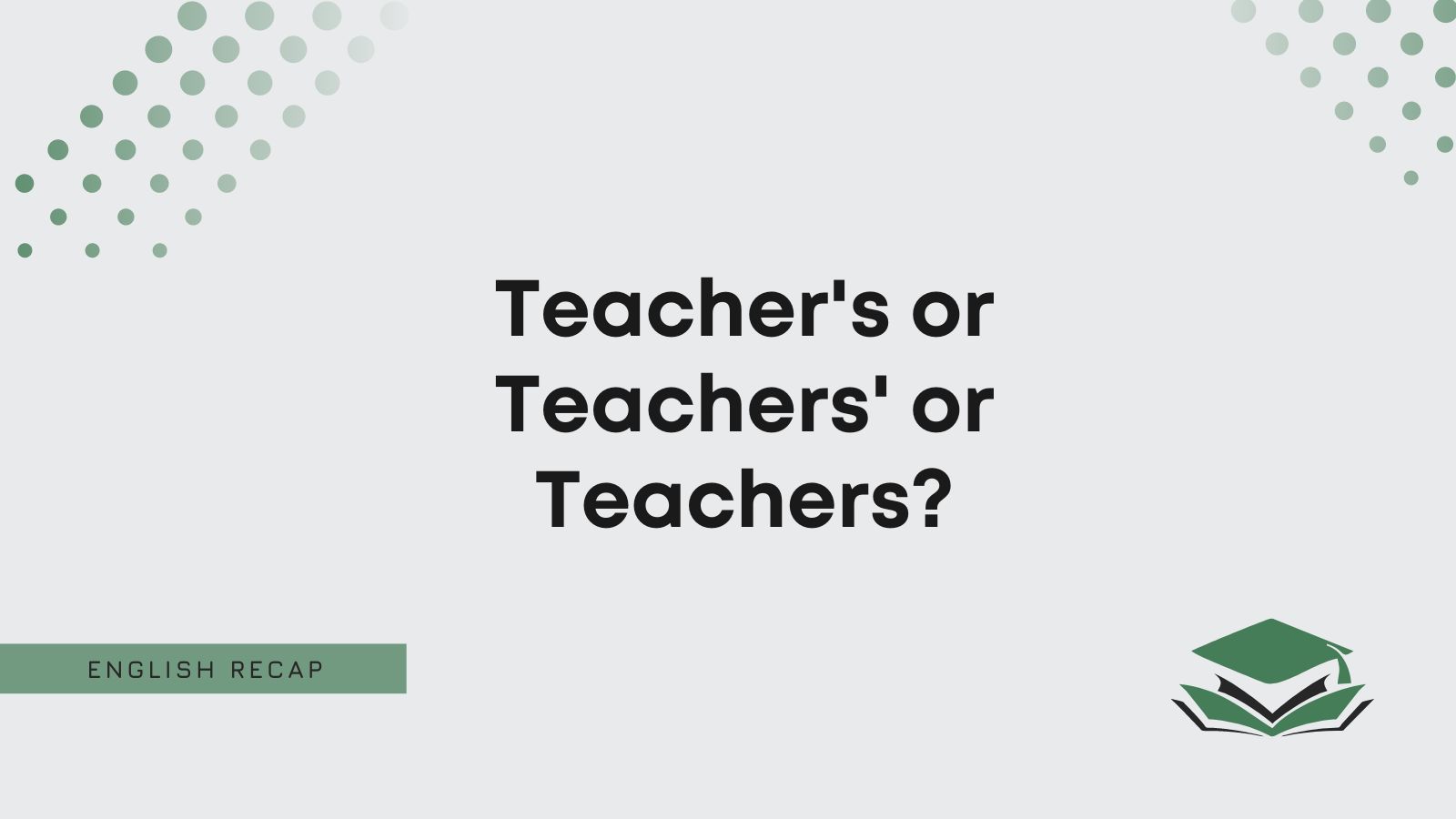The word teacher’s is the singular possessive form of teacher. E.g., “The teacher’s comments about Brian were not positive.” Furthermore, teachers’ is the plural possessive version of teacher. E.g., “Happy Teachers’ Day.” Also, teachers is the standard plural form of teacher.
The following chart provides an overview of the different forms of the word teacher.
| Singular | Teacher |
| Plural | Teachers |
| Singular possessive | Teacher’s |
| Plural possessive | Teachers’ |
As you can see, the word teacher has a regular plural that you form by adding an “s.” Furthermore, you create the singular possessive with an apostrophe between the “r” and “s.” Also, you make the plural possessive with an apostrophe at the end of the word teachers.
The following examples show the different forms in context.
- Singular: The teacher told Michael to leave because he was causing a disturbance.
- Plural: Mrs. Jones was one of the best teachers I had in secondary school.
- Singular possessive: The teacher’s words greatly impacted the class.
- Plural possessive: The school rejected the teachers’ requests for less administration.
To ensure that you never make a mistake with the possessive forms of teacher, please continue reading the rest of the page to learn more about the different forms and how to use them in your writing.
Teacher’s
Teacher’s is the singular possessive form of the word teacher. Therefore, you can use it to mention things that belong to one teacher.
These things can be intangible things such as words or impacts. As shown in this example:
- The teacher’s impact on the students was impressive.
- The teacher’s dedication to her students was truly admirable.
- The teacher’s feedback on my essay helped me improve my writing significantly.
- The teacher’s approach to teaching complex concepts made them easier to understand.
- The teacher’s encouragement boosted the confidence of many hesitant students.
- The teacher’s philosophy was that every student could succeed with the right support.
You can also use the singular possessive to refer to physical objects possessed by one teacher. For example:
- The teacher’s car was old, but it had character.
- Everyone admired the teacher’s collection of vintage books in his office.
- The notes in the teacher’s handwriting proved invaluable for exam preparation.
- The teacher’s laptop contained years of lesson plans and resources.
- The artwork on the teacher’s wall was a gift from a former student.
- I borrowed a novel from the teacher’s personal library.
Furthermore, the word teacher’s appears in common phrases such as teacher’s pet, which refers to a teacher’s favorite student.
- Molly was always the teacher’s pet in every subject.
- John was often teased for being the teacher’s pet because he always completed his assignments early.
- Being the teacher’s pet doesn’t always mean you’re the smartest; it sometimes means you’re the most diligent.
Teachers’
The word teachers’ is the plural possessive form of the word teacher, and you use it when stating that something belongs to multiple teachers.
The thing that belongs to teachers can be something physical, like objects or places.
For example:
- The teachers’ room is on the 1st floor.
- The teachers’ desks in my school are made of wood and metal.
- The teachers’ parking area is located behind the main building.
- The teachers’ lockers are conveniently placed next to the staff lounge.
- All the supplies in the teachers’ cabinet are for classroom use only.
Furthermore, you can use teachers’ for other things that are not physical. Such as words, stances, or periods of time.
For example:
- Happy Teachers’ Day to all the teachers who work so hard.
- The teachers’ end-of-term speeches left some students in tears.
- The teachers’ opinions were taken into consideration during the curriculum revision.
- The teachers’ collective voice was crucial in negotiating better terms for their contracts.
The first example has a capital letter because it is an official celebration, similar to Christmas or New Year.
Teachers
The term teachers is the plural version of the word teacher.
Therefore, you can use it to mention a specified number of teachers:
- The three teachers have lunch together every day.
- The group of teachers collaborated to create a new workshop for students.
- The two teachers often co-taught lessons to share their expertise with students.
- A team of teachers will be attending the educational conference next month.
Or, you can use it to refer to all teachers:
- Teachers have a challenging job on their hands.
- Teachers play a vital role in shaping the minds of young individuals.
- I remember the days when teachers would read us stories in the library.
- Teachers are often underappreciated for the hours they put in outside of the classroom.
Furthermore, you can use the word teachers to mention one teacher if you combine it with other terms, such as:
- One of the best teachers I ever had was Mr. Wilson.
- One of my history teachers was from Australia.
- One of the science teachers, Mrs. Green, inspired me to pursue a career in biology.
- Among all my language teachers, Ms. Rivera had the most influence on my love for literature.

